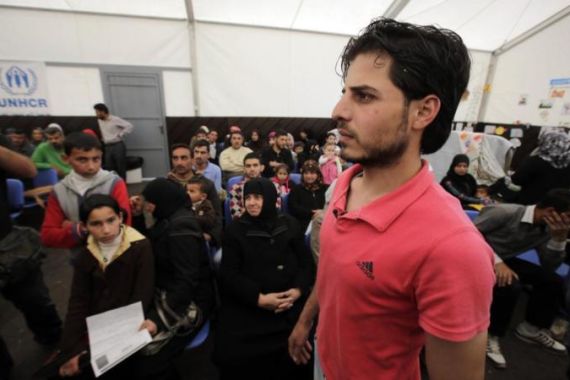Lebanon’s millionth refugee
Today the one millionth refugee will register in Lebanon. What can he and his family expect?

After three months in Lebanon I wrote that this miraculous country is held together through money, the fear of going back to the past, and the ingenuity and resilience of the Lebanese. The Syria crisis is testing this assumption to breaking point.
Today, April 3, the one millionth refugee will register with UNHCR in Lebanon. He will leave the UNHCR registration centre with his family, clutching a sheaf of precious white papers. These forms, each with a family member’s photo and signature, reinforce his status as a refugee. They will quickly become worn from being folded and unfolded as he uses them to prove his family’s entitlement to aid.
The smallest country in the Levant now hosts twice as many refugees as Jordan. For every two refugees registered in Turkey, there are three in Lebanon. It’s the highest per-capita refugee population in the world, and the most expensive. Imagine the entire population of Romania moving to Britain, or 80 million Mexicans arriving in the US.
The cost of living in Beirut is comparable to London, Tokyo and New York. And Lebanon, struggling with its own conflict-ridden past, doesn’t house refugees in neat camps, remembering the impact of waves of Palestinians fleeing violence in the last century. Instead the refugees live in “informal tented settlements”, camps by any other name. Wooden-framed tents made from billboards, UN-issue plastic sheeting and awnings covering scraps of rural wasteland. At one I visited, they had used old advertising boards picturing Beirut high rises – humour amid the hardship.
|
|
| Inside Syria – Syria’s conflict: Three years on |
The price of delivering aid is rising. It costs more to feed a refugee household for a month in Lebanon than a year’s full care for a Somali refugee in Kenya. So Lebanon needs $1.7bn this year alone to offer its guests basic food, shelter, sanitation, healthcare and education. That’s on top of the enormous cost to the Lebanese economy of the Syria conflict: $7bn, according to the World Bank.
There is only one way to put an end to this crisis: a political solution, scandalously overdue, to the conflict in Syria. While that remains elusive, the UN needs access to vulnerable populations inside Syria where aid can be more effectively delivered. Too many countries are spending more on the weapons that fuel the conflict than help for its victims. Three years on, all involved need to ask themselves whether they are really part of the solution or part of the problem.
Whatever happens in Syria, it will take time before Lebanon’s million Syrians can return. The UN is leading a heroic operation in tough circumstances.
Cat Carter of Save the Children asked in her excellent blog this week, where is the anger? I found a taste of it recently in Zahle, in Lebanon’s Bekaa Valley. Alaa, a young woman from Homs, told me that her family had lost everything and her father’s chain of shops had been looted and shelled. She had been training to be a French teacher, but when I tried to speak to her in French she became too upset to carry on. Now she and her husband have been deselected for food relief because there was not enough to go around. Women refugees have the worst nutrition in Lebanon, with nearly 10 percent suffering from acute malnutrition – comparable to rates in DRC.
The father of Nour, a five year-old from Aleppo, was angry too. He told us that it was all very well her smiling for the media, but he was still waiting to hear the response to their application for support. Polio is threatening to return to Lebanon having been officially eradicated in 1999. I don’t want Nour to be among its victims because of a war she is too young to understand.
And the one millionth refugee? Scraping together the money for the bus, perhaps he will take his children to school in time for the afternoon shift – Lebanese schools are now offering double shifts to accommodate the Syrian influx. He’ll pound the pavements looking for work on a building site or in the fields. Meanwhile he will borrow the rent on his shared tent from friends and family. While in Lebanon he will rack up debts, and try to find ways to explain with dignity to his family what has happened.
There are an increasing number of issues competing for our attention: Crimea, the World Cup, new apps, celebrity divorces. History’s moments of greatest shame have come when we see fellow humans as statistics, or when we have become immune to their suffering.
The millionth refugee will have a name, a story, a past. The millionth refugee has every right to ask us all if he will have a future. That’s a subject worth getting angry about.
Tom Fletcher is the UK ambassador to Lebanon.
